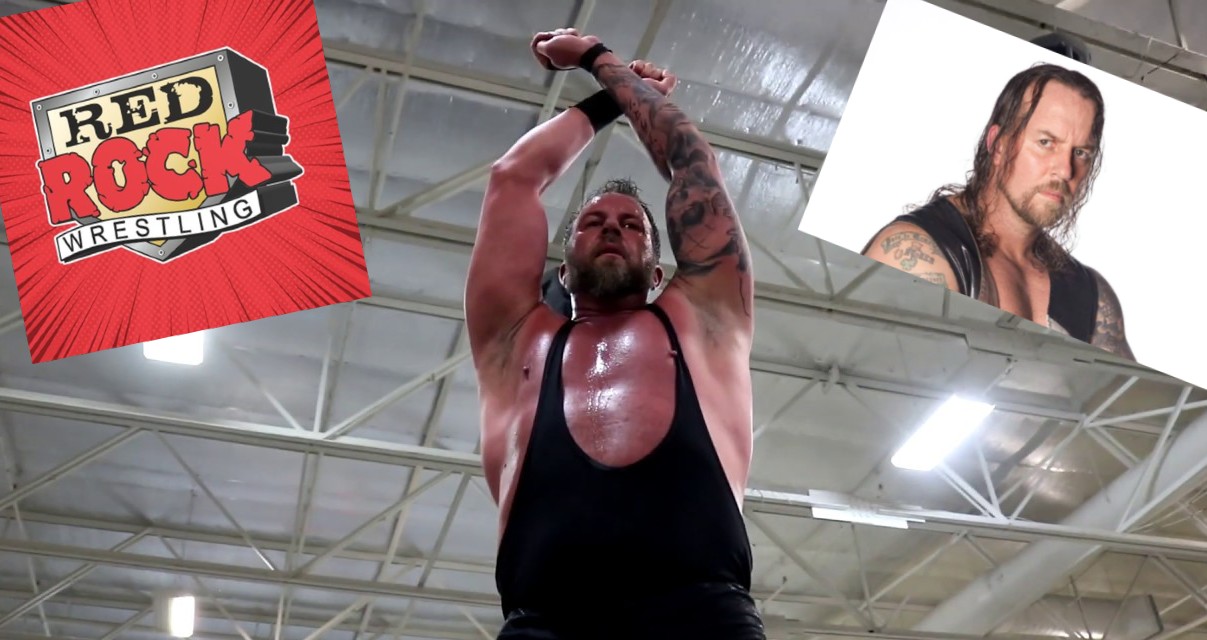Kowboy Mike Hughes recently decided to hang up the wrestling boots for good after 23 years. He’s accomplished a whole heck of a lot in those two decades and a half or so, but he stated in an interview that he almost missed the whole thing, and all because he was so focused on doing the work; it all happened so fast, and only now is he capable of realizing just how much he accomplished in years in the ring.
His ‘last ride’ was scheduled for October 7, 2022, but unfortunately he wasn’t medically cleared to wrestle on that previously publicized occasion. He did do a few spots in the ring, but an official match was out of the question on that night. Doctor’s orders.
So technically, his last official match in the realm of professional wrestling was against Titus, and in a steel cage of all places. It isn’t always easy for an athlete to give it all up and move on, as pro wrestling fans learned from The Undertaker’s docu-series, The Last Ride, but in the end, it’s a decision all athletes are faced with.
“I’m 48 years old this year, and I’ve taken on like a lot of injuries over the years. I have pretty much broke and separated, dislocated everything. And earlier in my career, I fractured some vertebrae in my neck,” Hughes told SlamWrestling.net [he turned 48 on November 7]. “I’ve accumulated an insane amount of concussions over the years. And then the final nail in the coffin, so to speak, was, I tore my Achilles last year, last November. And tearing an Achilles at 48 is catastrophic. I just wanted to go out on a high note; my last match that I had before (October 7) was a cage match at Stratford [Prince Edward Island] with Titus.”
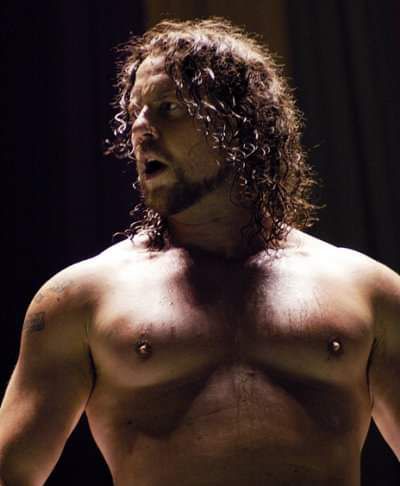
Kowboy Mike Hughes
For those that perform in the ring at a high level, or rather at a level that they are comfortable at, or even fans themselves know they can perform at, it’s damaging to the psyche to know that fans would possibly one day think that he or she has lost it, and it was no different for Hughes.
“I was able to perform at a high level in that match. I just never want to be one of those old guys that was on the curve; you know, I’ve been on a lot of curves with a lot of these older wrestlers. I’ve heard the people around you, ‘Hey, do you remember when that guy used to be good?’ or, they’d be disappointed that they paid to see a guy they heard so much about and then were let down. Fans that had supported me for almost 24 years, the thought of letting them down and not bringing the expectations that they were used to from when they paid for a ticket, and to see Kowboy Mike Hughes, then to be let down, it was just something that I just didn’t want to be a part of.”
After meeting Edge, Christian and former CFL star Glenn Kulka, in the early 2000s — all three men were wrestling for WWE at the time — Hughes was inspired, especially by Kulka, who stated told Hughes he sure had the body for wrestling and to give it a try; the other two concurred, and so he did. They told him to get in touch with long-time New Brunswick wrestler and promoter Emile Dupre, father of Rene Dupre of WWE fame. Hughes started training under “Handsome” Hubert Gallant and The Cuban Assassin. And that was the start of a 23-year career full of ups and downs, leading to his final curtain call.
“I want people to remember me at my best. I don’t want people’s last memory of me to be somebody that couldn’t go. I worked so hard over the years, traveling the world to hone my craft and to be the best wrestler that I could possibly be,” said Hughes. “I didn’t want to shortchange anybody or shortchange myself. I hold my work at a high expectation, and I demand the best for people as a promoter and a booker to be at their very best. And for me to continue on and not be able to give my very best, I’d be a hypocrite.”
And so no, as stated, because of his accumulated injuries, doctors would not let him have that last match, but he was able to say goodbye to the people that mattered before hanging it all up.
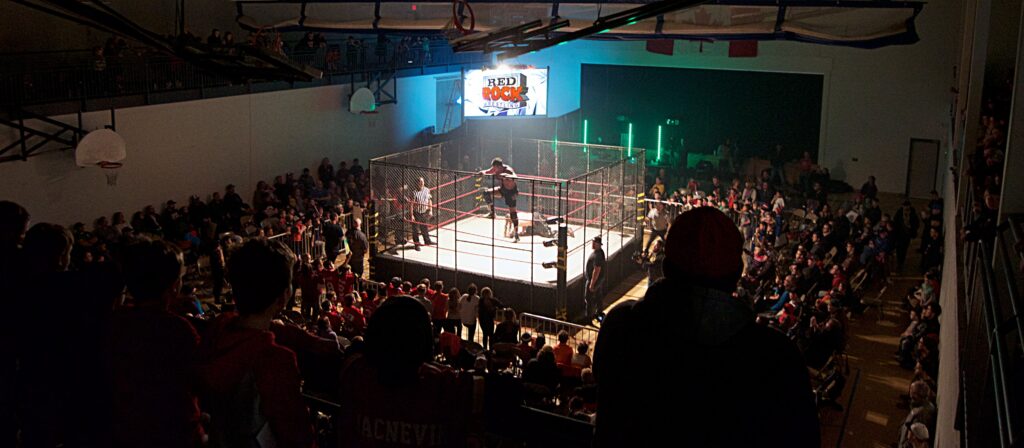
It was in Prince Edward Island’s first ever steel cage match that Mike Hughes defeated Titus. Red Rock Wrestling Facebook photo
“[On October 7] At the end of the main events the fans got to see me do something and send them home happy and gave me an opportunity to thank my fans because it was cool that I never really got the chance to tell if it had ended well,” said Hughes. “I felt I owed the fans to the opportunity for me to thank them for all their support. I’ve been on Prince Edward Island. The support I’ve gotten here has been out of this world like the Maritimes overall and most of the places I went. I’ve always had a strong fan base here on Prince Edward Island.”
But of the career, what a whirlwind it has indeed been. He’s touched down in WWE (albeit briefly) in the early portion of the 2000s. He wrestled for New Japan, went to so many other locations on this planet to hone his craft, as he stated, and it did eventually snowball into something that resulted in more than a cult following and huge show of support in his home province.
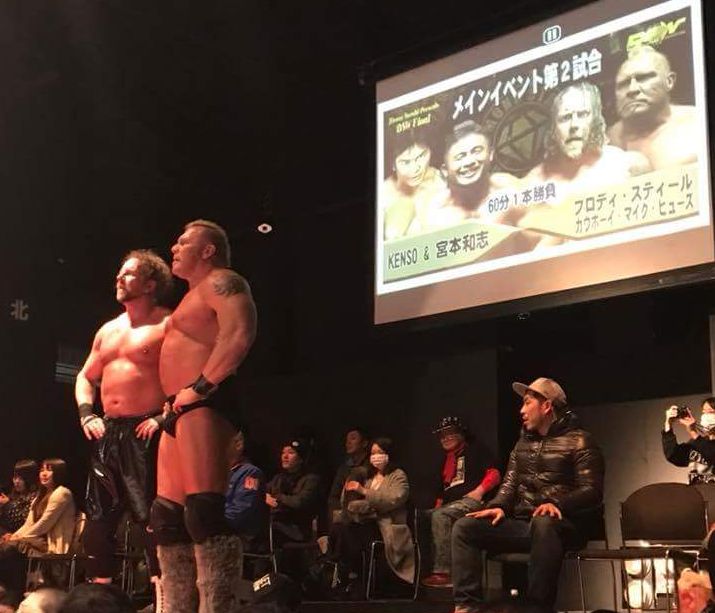
Kowboy Hughes and Brody Steele in Japan.
“You’re doing it and you’re in it, sometimes you forget just how much you’ve done and the contributing factors and the joys and the ups and downs and the rounds and rounds that go with pro wrestling… and it didn’t really sink in how much influence that I did have in the area. Until you hear it back, when you’re just doing it, you’re just doing it right, you’re just working your butt off to make pro wrestling better everywhere that I’m at, right?” mused Hughes. “To hear that validated, all that hard work, back from your peers and people that you respect in the business, that was pretty gratifying because I think the premier, every pro, every legitimate organization that’s been in Atlantic Canada in the last 20 years, I’ve been at the foundation of it across Newfoundland to New Brunswick, P.E.I., North Sydney, and everywhere in between.”
What does legacy mean for a man like Mike Hughes? He is a man who sacrificed many comforts in life to wrestle in places around the globe and in Canada for a lot less money than most in the business, especially those at a higher level. In the end, it means a lot, as it does, one would imagine, for any artist, athlete. It doesn’t for anyone; specifically for a man like Brock Lesnar, who Mike Hughes was affected by throughout his career for another reason altogether.
Earlier this year, Lesnar stated on an episode of Pat McAfee’s podcast that legacy doesn’t really matter to him, but perhaps some would argue, that was because a lot was handed to the gifted ‘next big thing’ Brock Lesnar, whereas someone like Mike Hughes had to claw, scratch, sacrifice and travel the world without that big payday. Perhaps that’s why legacy matters to a man like Kowboy Mike Hughes.
It was when Hughes finally did acquire for himself a contract with NJPW — two tour contracts — that he would ultimately feel the effects of big business in the pro wrestling game. Lesnar, after leaving WWE, would wrestle in Japan and in order to pay him the type of money he wanted, contracts to Mike Hughes and others (which included Harry Smith), were deemed less important to the business machine that was NJPW.
“I still keep the contract at home in my office … [it] was one of my best paying contracts,” recalled Hughes. The deal was with Inoki Sports Management, and then the company was sold. “The whole Brock Lesnar thing came up, and they cut my contract and Harry Smith’s contract to make money for Brock Lesnar… Brock Lesnar and [Kurt] Angle did their whole thing and then [Antonio] Inoki, I think, sold New Japan to UCS.”
And the rest, as they say, is history. But just what of those dues paid by Mike Hughes? Those long nights and days on the road, working out in strange gyms, eating strange food and putting up with it all for the greater good? Where else did Mike Hughes wrestle? Turns out for some of the more legendary promotions on the indy circuit ever.
“Me and Brody Steele were the last generation of the territory wrestlers here in Canada. We were the last to work Grand Prix. We were the last to work Real Action Wrestling. And then we were the last to travel and work for years and also wrestle in England. And then for myself, I went to Puerto Rico for two,” recalled Hughes. “I’ve been so blessed that I got to be a part of that last historical era and learn from all the greats. And for me, I always felt it was my duty to pass that on and teach the younger generations so that that could carry on.”
Along the way, Hughes tangled with a Canadian legend, who had wrestled in Atlantic Canada early in his own career — Hot Rod himself.
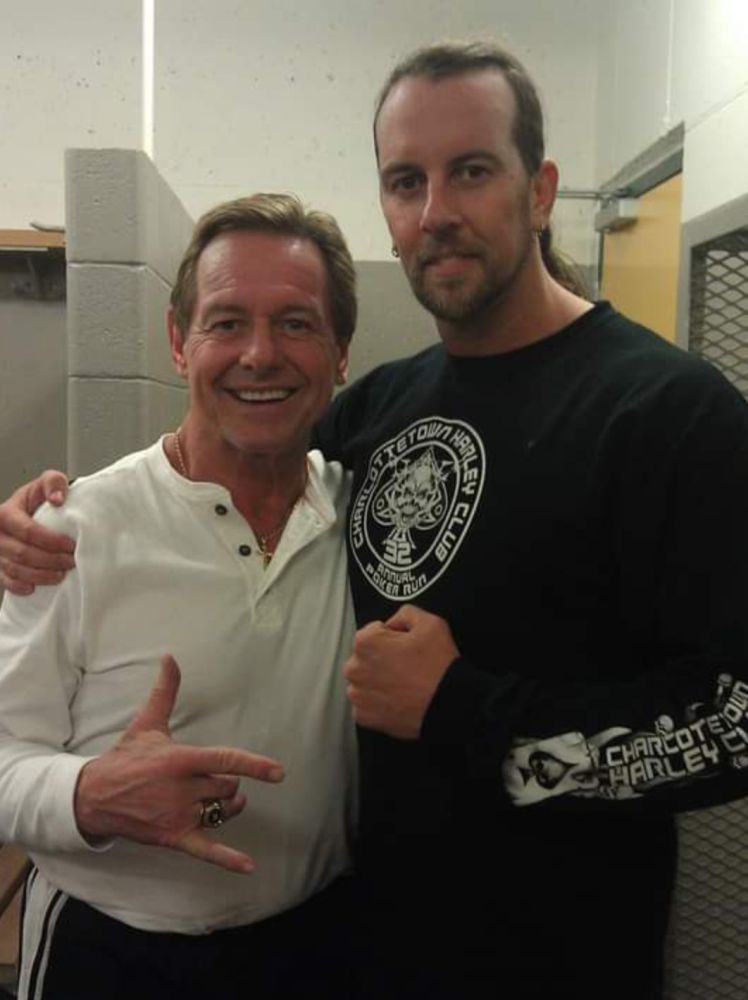
Roddy Piper and Mike Hughes.
“Roddy Piper was amazing. Roddy Piper and I bonded so well,” said Hughes. They initially met on a wrestling tour in Newfoundland and Labrador. “The two of us just clicked when we were talking… it’s funny because him and I had had a bit of an argument over the finish that I was going to do and he wasn’t happy about it, and so he was explaining how he wanted to do it…
“I said, ‘Listen, man, we have a territory around here. You’re good for a quick pop. I’m looking at long term business.’ Piper came back a little later and he just looks at me and he looks me up and down. He runs his hand over his face and he says, ‘I thought about it… you’re right.’ He goes, ‘You’re a good booker… I didn’t realize.’ I said, ‘I worked in this territory for the last four years, I just know the audience.’”
There was a special moment on that show at Joe Byrne Memorial Stadium in Grand Falls-Windsor, NL, on September 12, 2012. “We went out that night and we got talking and we got talking about Puerto Rico and England. And he said, ‘You spent two years in Puerto Rico?! You’re crazy. I barely got out of there alive… Those crowds are crazy,’” remembered Hughes. Piper died less than three years later, in May 2015.
What happened with that ill-fated run in WWE? It started out with all the promise in the world and just ended abruptly. Hughes has a great way of looking at that time and that experience.
It was Monday, May 5, 2003, at Halifax’s Metro Centre, and Hughes was sent out to face Tyson Dux for a match prior to the Sunday Night Heat taping and then Raw. “Tyson Dux and I opened the show and it was in Halifax where we had been wrestling with Grand Prix wrestling since 1999. So now we’re in 2003 and we were doing pretty good business in the Maritimes at the time,” said Hughes. “It was funny. The fans started chanting ‘Kowboy!’”
It wasn’t just two nobodies warming up the crowd, and important people noticed, said Hughes. “After the match, everybody said it was good. And then Sgt. Slaughter comes over to me afterwards and he says, ‘You know, Vince [McMahon] was walking by the monitor and he heard the people cheering your name. First he didn’t know what they were chanting. And then we realized that it was for you.’”
Smackdown was being taped the next night in the same venue, and Hughes was invited back, appearing on Velocity, teaming with Mike Bartalucci in a losing cause against Johnny Stamboli and Chuck Palumbo.
Hughes was asked to go down to the WWE developmental territory, Ohio Valley Wrestling, in Louisville, Kentucky, where he had planned to stay for 14 days (OVW). “I was supposed to be signed … and then I got a phone call on day 14, and it was from Johnny Ace [Laurinaitis], saying that, ‘We’re going to move on to another direction.’” According to Kowboy, Laurinaitis told him that WWE wanted “to focus more on cosmetically appealing talents like Randy Orton and John Morrison.”
A chuckle. “I was just kind of like, I think he just called me ugly. We had a difference of opinion on what mattered.”
The WWE snub never stopped Kowboy, just as he never stopped representing PEI. He has promoted shows in the province for years, usually under the Red Rock Wrestling banner. There will be more to come of that, even if he is not an in-ring performer.
He has elected to “be able to spend more time with the wrestlers, be able to teach the wrestlers, the younger guys on Red Rock shows, really fine tune the timing of the shows, the finishes, everything like that. That’s more what I’m going to do and try to maybe expand on maybe more dates for Red Rock.”
It is an old-school plan, and Kowboy Mike Hughes, retired, is happy with that label.
“Never say I’m a sports entertainer. I’m a professional wrestler. I’m an old-school professional wrestler. I learned from the old-school guys and it was always about working safe, working smart, and all the little details, doing all the little things right to make it look better,” he said. That is the beginning of a mini-rant, set off, in part, by a discussion of a stiff match coming out of AEW in Toronto, where Athena took offence to Toronto’s Jody Threat for laying them in heavy. “In order to keep their attention from the lack of storytelling, they’re trying to make it up with stunt work. Wrestling used to be like a simulated fight, and it doesn’t even look like a fight anymore. It looks like a gymnastics event or choreographed running from place to place…
The message isn’t done.
“For me, I want to be able to detail. I didn’t tell my guys what I expect of them in the ring at Red Rock. I tell them what I expect them not to do. I tell them what I tolerate. I tell them the story that’s trying to be told in their match that I want put across to the audience. And then I explain to them how that story and tale adds to the bigger story, which is the whole show. I try to add all these factors in when I’m putting the show together to have these people emotionally attached and emotionally high when they leave so that they want more when they come back.”
In the end, the youth movement present in the world of pro wrestling would do good to listen to the likes of Kowboy Mike Hughes — it just won’t be in the ring any longer.
PREVIOUS KOWBOY MIKE HUGHES STORIES
- July 14, 2011: Territories return to Atlantic Canada
- Apr. 27, 2009: Kardinal Sinners docu-drama a peek into roller-coaster ride of indy wrestling
- Nov. 5, 2007: Review: Wrestling Reality shows pain and passion
- Sep. 25, 2007: Wrestling Reality takes viewers behind the curtains
- Mar. 8, 2005: Hangman Hughes terrorizes Puerto Rico
